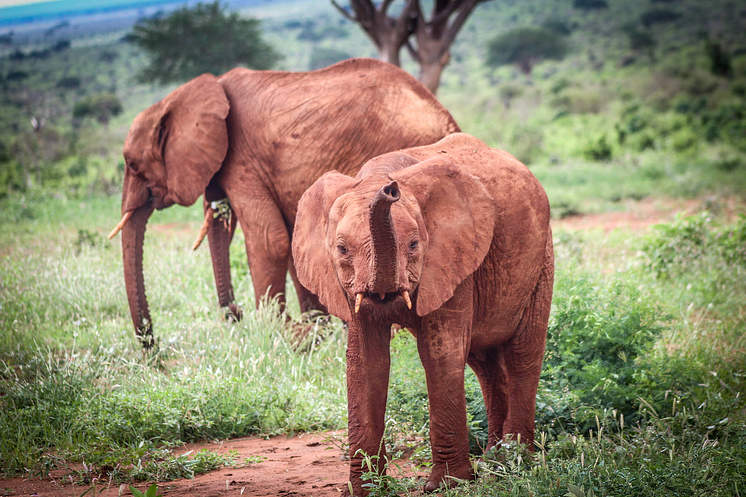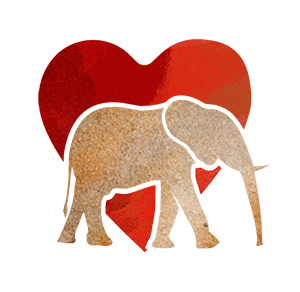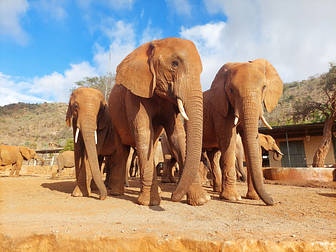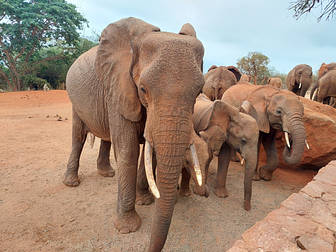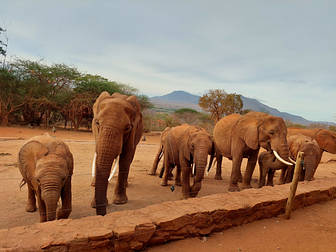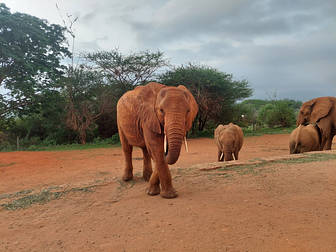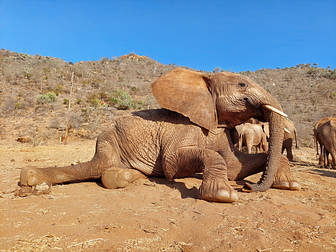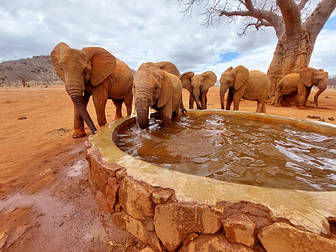The drought in the southern area of Tsavo East National Park was brutal last year, the worst recorded in over 35 years, with close on 400 elephants succumbing to the conditions brought on through lack of food rather than lack of water. Poor rains for three years culminated in a tragic spectacle in the months of July, August, September and October of 2017. It was heartbreaking to watch the weak, young and old falling victim to such unforgiving conditions. With the country largely gripped in drought, and a huge strain on all the resources throughout, there was no quick fix available to provide food for literally hundreds of wild elephants in an area the size of Israel. We received many drought victims last year who came into our care, young calves found more often than not already in a state of collapse as a result of starvation. Tahri, named after the area she was first located along the Voi River circuit of Tsavo East National Park, was another drought victim, but thankfully was sighted in the nick of time.
On the 17th September 2017, Park visitors first came across her alone. She had most likely been abandoned, because she no longer had the strength to continue with the herd in search of food, and was left to die. The matriarchs in these situations are forced to make incredibly tough decisions as they must look after the interests of the whole herd. Thankfully everyone involved in saving Tahri responded rapidly and swift decisions were made because in her case, every hour mattered. The visitors who sighted this lone, emaciated baby of approximately two years reported the matter to the Kenya Wildlife Service (KWS) headquarters, who turn immediately contacted the DSWT Voi Keepers and DSWT/KWS Mobile Veterinary Unit, requesting that they rush to the scene and rescue the calf. The little female was not able to put up much fight and was restrained easily and loaded into the vehicle on hand to be transported back to the Voi Stockades. She was then placed in a taming stockade at the DSWT Voi Reintegration Unit, the first of the DSWT facilities built by David Sheldrick back in the late forties and early 1950’s. Angela made the decision not to bring the calf up to the Nairobi Nursery given her age, her general condition, and the fact that she had been rescued just 20 km from the Voi Reintegration Unit.
The first days were very precarious indeed, as is always the case with starvation victims. It requires a slow, patient approach to start to introduce solids again, as their stomach and whole system very often cannot tolerate it initially. Thankfully Tahri was a determined baby and made our work easier because of her fierce will to live. She cooperated well and fought hard to survive by feeding both on the freshly cut vegetation (that we had to work hard to find on the high reaches of Sagalla mountain situated outside of the National Park), and she was eager to feed on the diluted milk formula we first started with.
The challenge was the unforgiving heat each day as the temperatures continued to soar, and despite her stockade boma having a shaded area there was little respite from the heat, and on an already parched body ravaged from sun-stroke, just the heat alone can spell the end when the calf is left with no reserves. A custom built mud bath and water troughs brim full of water helped her cope with that, as she resorted to splashing water over herself constantly lowering her body temperature, and she also enjoyed the freshly mixed mud bath each day, all the while still within the constraints of her taming stockades. Thankfully the taming stockades are situated within the stockade enclosure so when the dependent orphans are brought back home to their night stockades they were able to fraternize with her, communicating and encouraging her to grow stronger and ultimately overcome great odds. This contact can never be underestimated in extreme situations; it can be the difference between life and death, because only with a will to live would a calf be able to overcome such an extreme situation. Tahri was a very special baby and the many dependent females in the Voi orphans herd recognized these qualities and soon fell unconditionally in love with her.
In time as her strength grew, she was able to join the other dependent orphans out in the bush each day, and from that moment on she never looked back. Tahri has many Mums and loves them all, as Kenia, and Ndii, Ishaq B and others constantly fuss around her pandering to her every whim. The warmth, and attentive love and care she receives every day has been a marvel to watch and as a result she is a very happy and content elephant, who now has a second adopted family. She is one of the very lucky few who was discovered in time, sadly, so many others in the vast landscape that is Tsavo National Park, were not so fortunate. It is a year on since Tahri was rescued and she is a happy member of our Voi dependent elephant herd, and despite mixing with wild elephant herds almost daily, she has chosen to remain with her new Mums, and the human family who worked so hard to save her precious life.
